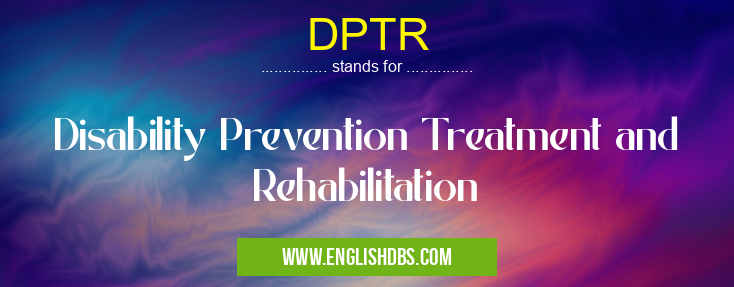What does DPTR mean in PREVENTION
Disability Prevention Treatment and Rehabilitation (DPTR) is a field of research which focuses on the prevention, treatment and rehabilitation of physical, cognitive, mental and social impairments in individuals with disabilities. It aims to enable those with disabilities to participate fully in their communities, by providing access to appropriate services, care and support. DPTR programs are tailored for each individual's needs, enabling individuals to reach their highest potential.

DPTR meaning in Prevention in Medical
DPTR mostly used in an acronym Prevention in Category Medical that means Disability Prevention Treatment and Rehabilitation
Shorthand: DPTR,
Full Form: Disability Prevention Treatment and Rehabilitation
For more information of "Disability Prevention Treatment and Rehabilitation", see the section below.
» Medical » Prevention
What is DPTR
DPTR includes early identification and intervention of disabilities as well as strategies for prevention and management that aim to reduce the impact of a disability on an individual's quality of life. It focuses on both primary prevention initiatives (aimed at preventing disabilities from occurring) as well as secondary prevention initiatives such as early identification or screening that can help prevent functional decline or additional disability. In addition, it emphasizes rehabilitative services such as physical therapy, occupational therapy, speech therapy, cognitive rehabilitation therapies and psychological services aimed at restoring functioning to its highest level possible.
Essential Questions and Answers on Disability Prevention Treatment and Rehabilitation in "MEDICAL»PREVENTION"
What is Disability Prevention Treatment and Rehabilitation (DPTR)?
Disability Prevention Treatment and Rehabilitation (DPTR) is a multi-faceted approach to helping individuals with disabilities maximize their potential and participate as fully as possible in their communities. It covers services such as health promotion, diagnosis, early detection, treatment, rehabilitation, support services and follow up care - all designed to improve the quality of life for people with disabilities.
What is the goal of DPTR?
The goal of DPTR is to reduce disability through preventive measures, empowering persons with disabilities to manage their condition, overcoming barriers and providing opportunities for full social integration.
Who can benefit from DPTR services?
Persons with physical or mental impairments or disabilities can benefit from DPTR services. This includes those who are born impaired or those who acquire impairment or disability due to accidents, illnesses or other causes.
What types of support does DPTR provide?
DPTR provides primary healthcare services, early detection of impairments, therapeutic interventions such as physical therapy, psychological counselling and vocational rehabilitation. It also provides cultural and leisure activities that enhance the quality of life.
How are people chosen to receive DPTR service?
People are chosen based on referral criteria which consider factors such as severity of impairment/disability, age range and financial ability. The type of service received depends on individual needs and interest.
Where can I find a service provider with experience in DPTR?
Local organizations working on disability issues should be able to provide you with information about experienced professionals who offer Disability Prevention Treatment and Rehabilitation services in your area. Alternatively you may do an online search for qualified specialists in your country/region.
How often should I receive DPTR services?
The frequency of receiving services will depend on individual need and nature of impairment/disability. Generally speaking however it's recommended that one review progress every 6 months or so even if no changes occur during that period.
Are there any special requirements for access to DPTR programs?
Accessing these programs usually requires a valid medical certificate confirming the presence of an impairment/disability plus other legal documents depending on local laws and regulations related to disability rights.
Final Words:
Overall, Disability Prevention Treatment and Rehabilitation (DPTR) is an approach that works to prevent or reduce the occurrence of impairments by targeting environmental factors before they occur; identify existing impairments at an early stage; intervene quickly when possible; build resilience; reduce impairment related stress; provide support for daily activities; promote positive engagement in meaningful roles within society; develop relevant skills acquisition/expression approaches; foster recovery through rehabilitative supports when needed; provide adequate resources for independent living; establish community-based supports/services wherever possible; strengthen social inclusion networks.
